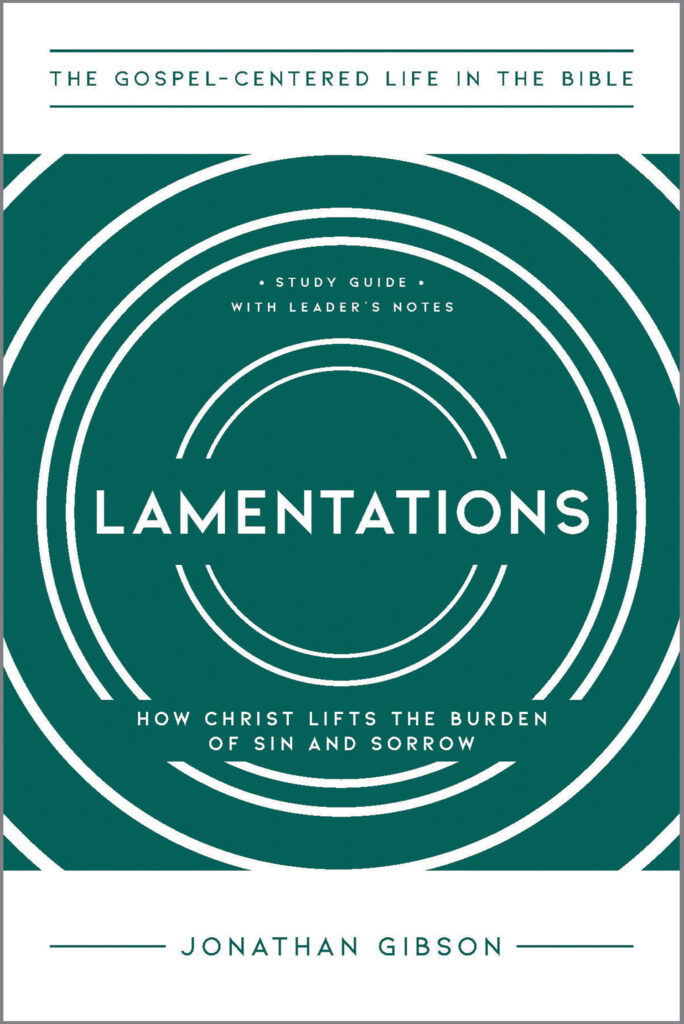The afflicted man’s journey from the darkness of despair to the light of hope in Lamentations 3 is of significance for every Christian. As sinful people living in a fallen world that is under the power of the devil, we may suffer for our own sin, like this representative Judahite man did; or we may suffer for some providential reason, like Job did. Or we may suffer for what others have done to us, like Joseph did. But whatever our experience of suffering, and whatever reason behind our suffering, we can identify with the experience of this man of affliction, at least to some extent.
Suffering of whatever kind—spiritual, physical, psychological, emotional—can leave our soul feeling embittered and bowed down. We can feel bereft of peace and happiness. Our strength and energy can wither inside us as prolonged suffering wears on our souls. And we can feel like the hope that God once blessed us with is now dead. When we suffer, we can feel like God has withdrawn from us, or we can be tempted to withdraw from him. God can feel distant and nameless.
But the way out of such despair is given to us in the last word of verse 18: When the man reaches his lowest point in the dark, he finally names God in the dark. In the darkness of his despair, he names Yahweh, his covenant Lord, the one who providentially brought him into the despair.
This is the turning point for the man in his lament. The way out of the darkness is to name God in the darkness. Because when we’re in the darkness and left with nothing, then we realize that God is the only one left to help us. When we call upon God’s name in the darkness of our despair, slowly the darkness begins to dissipate in the light of his presence.
When our daughter Leila died, we committed to singing these verses every night:
The steadfast love of the Lord never ceases;
his mercies never come to an end;
they are new every morning;
great is your faithfulness.
(Lamentations 3:22–23)
There’s something about naming God in the dark, recalling his character of love, mercy, and faithfulness that actually lifts you out of the darkness of despair and brings you into the light of hope.
God’s steadfast love, his never-failing mercies, as well as his great faithfulness, form a trilogy of covenant terms connected to God’s name (see Exodus 34:6–7.) This is what the man recalls: the essential goodness of God’s character. Verse 23 provides a further qualification on God’s mercies: They are new-morning mercies—a comforting, daily truth. The final line “great is your faithfulness” is the emphatic climax to the whole description of God’s character. God’s faithfulness is great because his love is steadfast, and his mercies are never ending.
When we name God, we call upon his character of steadfast love and never-ending mercies, and we are not consumed. When we name God, we are recalling and affirming his covenant faithfulness. All hail the power of Yahweh’s name!
HOW SWEET THE NAME OF JESUS SOUNDS
As New Testament Christians, we call on God through the name of his Son, Jesus Christ. And chapter 3 provides a beautiful foreshadowing of Jesus through this “man of affliction.” Though Jesus knew no sin, he experienced many of the things this man of affliction experienced in Lamentations 3.
As both a representative for the people and a prophet distinct from the people, Jesus saw affliction under the rod of God’s wrath on the cross. He was driven and brought into the darkness of Gethsemane and Golgotha. God turned his hand against him by abandoning him to cruel men.
God made him dwell in darkness, like the dead of long ago, as he lay in death’s dark shadow for three days. God walled him about so that there was no escape from his enemies. God shut out his cry of dereliction on the cross, providing him with no answer. God’s arrows were fatal for him.
He became the object of scorn, a laughingstock and mocking song by all peoples, including his own. His soul was bereft of peace and he forgot happiness. His splendor and glory perished on the cross as he voluntarily gave up his life. He experienced affliction and homelessness throughout his life, all the way up to his death—the wormwood and the gall were his bitter food. His soul was bowed down within him.
And yet, in the darkness of despair on the hill of Golgotha, Jesus called to mind—consciously, deliberately, actively—the covenant faithfulness of God in the word of God. Each of Jesus’s statements from the cross revealed that his mind was fixed on God. He learned through bitter experience that God was all he needed because God was all he had. He could say from the cross, verse 24, “The Lord is my portion, therefore I will hope in him.”
And now, since Jesus has made the journey from the darkness of despair to the light of hope through faith in his Father, we can also make that same journey through faith in him during our times of suffering. When we call upon his name in the darkness, then the light will begin to appear. All hail the power of Jesus’s name!
It’s why his name becomes sweet to us as well. Knowing that he knows what it is to suffer, under the burden of sin, under the common curse for sin, the sound of Jesus’s name becomes sweet in our suffering. We have a Savior who knows what it is to suffer and yet he hoped in God in the midst of his suffering. And united to that same Savior by faith, our hope in God can be rekindled.
Excerpted from Lamentations: How Christ Lifts the Burden of Sin and Sorrow © 2025 by Jonathan Gibson. Used with permission of New Growth Press. May not be reproduced without prior written permission.
Lamentations: How Christ Lifts the Burden of Sin and Sorrow
What do we do when life goes very wrong? The biblical answer is that we start by turning to God and sharing our distress and pain with him. In his Bible study of Lamentations, Jonathan Gibson helps participants recover the lost, biblical art of lament and points us to Christ, who bears all our burdens.






